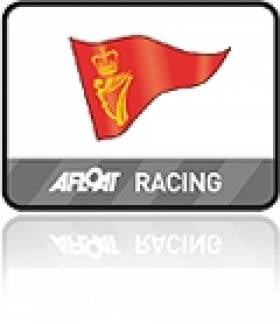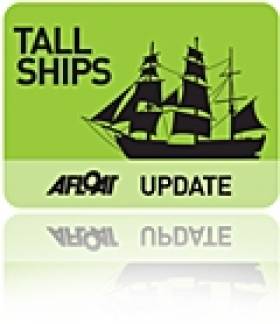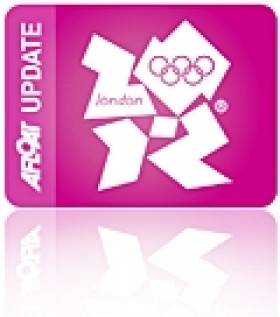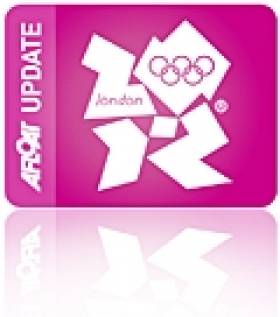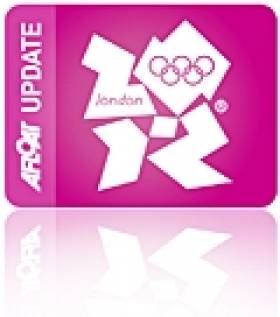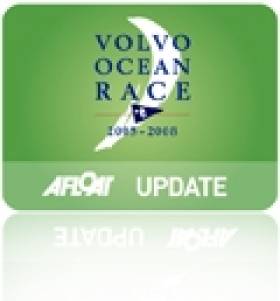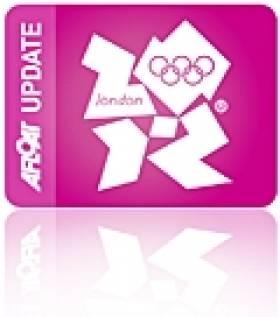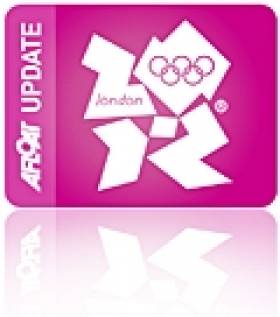Displaying items by tag: 2012
Cork Week 2012 Chairman Appointed
Royal Cork Yacht Club has announced Pat Lyons will chair the club's biggest sailing regatta next season. Cork Week 2012 at Crosshaven is scheduled to run from the 7th - Friday 13th July 2012 following a decison to move the date back a week to avoid a clash with the Solent's Round the Island Race. Lyons has served on Royal Cork's Club Executive for the last 4 years.
Round Ireland Yacht Race 2012 Starts from Wicklow on Sunday, June 24th
Tall Ships Will Sail to Dublin in 2012
It's official - the Tall Ships Races will be coming to Dublin in August next year!
As the Evening Herald reports, the successful four-day festival in Waterford this past weekend will be repeated in the capital from 23-26 August 2012, with up to 100 tall ships expected to sail up the mouth of the Liffey.
As keen readers of afloat.ie will already know, news of the Dublin event was published here back in March.
The event is hoped to attract more than a million visitors to the city, topping the 500,000 spectators who thronged Waterford from last Thursday to Sunday.
Young sailing trainees from Dublin will also have the opportunity of a lifetime to work on board the vessels.
Ireland is on the entry list in six classes for the Weymouth and Portland International Sailing Regatta 2011, the London 2012 Olympic Test Event, that has been finalised today.
Ireland's leading hopes for a top result is in the Radial class where Annalise Murphy took bronze at the Sail for Gold regatta at the same venue. There's also high chances in the Star class with Peter O'Leary and David Burrows. Also sailing for Ireland is James Espey is in the Laser, Ross Hamilton in the Finn, Ger Owens and Scott Flannigan in the 470, Ryan Seaton and Matt McGovern in the 49er. A full entry list is available for download at the end of this post.
Sixty six nations have submitted the names of the 460 sailors who will test the conditions at Weymouth and Portland one year ahead of the London 2012 Olympic Sailing Competition.
For many of Member National Authorities there has been a selection headache with nations following game time rules where only one athlete per event is allowed.
In the Finn class Great Britain's Ben Ainslie was selected ahead of Giles Scott and Ed Wright, Spain's Marina Alabau received the nod ahead of Blanca Manchon and Anna Tunnicliffe (USA) lost out to Sally Barkow (USA).
The Women's Match Racers open the Weymouth and Portland International Regatta on 2 August 2011 with the start of their Round Robins. The Men's and Women's RS:X begin on 4 August followed by the Laser, Laser Radial and Men's and Women's 470 on 5 August before the Finn, 49er and Star sailors begin their competition on 6 August.
The London 2012 Olympic Games Sailing Competition will take place at the Weymouth and Portland Sailing Academy and Portland Marina, located in Dorset on the South Coast of England. Racing is scheduled to take place from 29 July to 11 August.At the 2012 Games sailing will introduce women's match racing for the first time. The racing format will be a single round-robin, quarter finals, semi-finals and then the finals. The nine fleet racing events will all sail an opening series before the top ten in each event contest a double-points Medal Race to decide the final positions. The Medal Races have a target time of approximately 30 minutes and will take place close to the shore at the Nothe to allow spectators ashore to get close up to the action.
Irish Olympic Keelboat Trials Starts this Month
Act one, scene one of Irish sailing's bid for Olympic glory in London next years kicks off this month when rival helmsmen Max Treacy and Peter O'Leary square up for the right to represent Ireland next July at the Olympic Regatta in Weymouth.
The Irish Star keelboat Olympic trials gets underway on May 24th on the waters off Medemblik, Holland as part of the massive ISAF Delta Lloyd regatta.
O'Leary with new crew (and triple Olympian) David Burrows will go head to head with Treacy and Anthony Shanks in a 23-boat fleet that has attracted all the top teams, a mirror of next year's Olympic regatta itself.
The two Irish boats haven't met since last August when O'Leary sensationally won Britain's Sail for Gold Olympic test event at Weymouth and Treacy withdrew with boat problems.
Since then O'Leary and Burrows have been training in the USA scoring a significant second overall at the Bacardi Cup in February.
Treacy and Shanks have proved a formidable combination clocking up some impressive results over a decade or so in the Star class competing first for a place for Athens 2004, then Beijing and now London. It is understood the pair are hooking up next week with long time training partner (and British Olympic Gold medalist) Ian Percy for an intensive two week training session.
While the first of the nomination trials is to be held in Holland, the second is in July in Weymouth but it's worth remembering the first chance of nation qualification – where 75% of Olympic slots are up for grabs – is not until December in Perth, Australia.
The new procedures set out for Olympic qualification were announced by the Irish Sailing Association in January.
The memory of the selection debacle from four years ago is still very much in mind. Back in 2008 a decision to send O'Leary instead of Treacy was made by an ISA selection committee rather than on the water trials, a move that was unsuccessfully appealed by Treacy to the Olympic Council of Ireland (OCI). It was a divisive period for Olympic sailing in Ireland.
Confirmation this week that both teams are entered for the Delta Lloyd regatta in Holland and both boats are also entered for Perth indicates the stage is set for the next episode of Star wars.
Irish Olympic Crews in Top Twenty of World Rankings
Peter O'Leary who has been sailing with three different crews, David Burrows, Frithjof Kleen and Timothy Goodbody to date is ranked 17th by the International Sailing Federation (ISAF).
O'Leary and Burrows sailing in the Star keelboat class were recent top finishers at 93-boat fleet in Miami. They finished second overall after they lost the overall lead in the last race of the 2011 Bacardi Cup.
Listen into a podcast about Peter O'Leary's Olympic sailing plans HERE.
Fellow Olympic squad member, 21-year old Annalise Murphy from Dun Laoghaire is now ranked 12th in the Laser radial class counting seven ISAF events. Murphy has also had success in Florida this season, she finished fourth in the Miami Olympic Classes regatta in January.
Listen to what Team Manager James O'Callaghan has to say about her progress:
The next release of the ISAF World Sailing Rankings will be on 13 April 2011 and will include the Trofeo SAR Princess Sofia Mapfre in Spain.
The ISAF World Sailing Rankings rate skippers based on their performances over the last two years. Skippers score points by competing in ISAF Graded events. The top finishers at all ISAF Graded events score Rankings points, with the highest points awarded to the event winner and then decreasing down relative to position.
More Irish Olympic Sailing News HERE.
Crucial Stage for Volvo Ocean Race Sponsorship Talks
Negotiations to land €11 million in sponsorship for the finals of the Volvo Ocean Race in Galway next summer are at a 'delicate stage', the Galway City Tribune reports.
Six teams have so far been confirmed for the world's biggest sailing event, and Irish organisers are in talks with a number of potential overseas sponsors.
“We are at a delicate stage in negotiations in relation to a number of issues and plans are on track for a much bigger event this time around,” said John Killeen of Let’s Do It Global, a team that in its previous incarnation had Chinese sponsorship for its 2009 entry in the race.
The Volvo Ocean Race is set to attract more than half a million visitors, with close to 50,000 corporate guests, and is expected to bring in €80 million for the local ecomony in Galway.
The Galway City Tribune has more on the story HERE.
O'Leary and Burrows Pipped by Single Point for Bacardi Honours
France's Guillaume Florent and Pascal Rambeau accomplished a rare achievement in Saturday's finale of the 84th event Cup.
Florent, the 2008 Olympic bronze medalist in the Finn class who switched over to Star keelboat last year, won the prestigious regatta at his first attempt.
O'Leary and Burrow's second overall in the 93-boat fleet is being hailed as a major result for the pair who have sights firmly set on selection for the London 2012 Olympic Games.
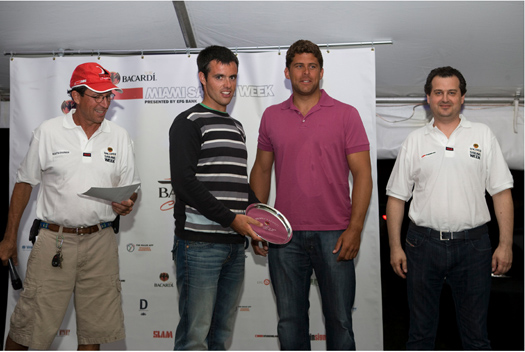
Peter O'Leary and David Burrows (centre) receive the Bacardi Cup second place salver in Miami yesterday. Photo: Courtesy Bacardi Cup/Star Class
Their final score after six races that began on Monday was 24 — only one point behind the French duo.
In a consistent display of speed and tactical ability against a big international fleet only Ireland posted the most consistent scores of the series with all results in the top ten.
Racing in the event was cut short due to thunderstorms on Thursday.
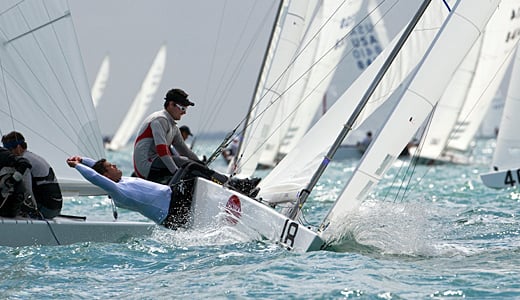
Peter O'Leary with crew David Burrows at full stretch at the weather mark. Photo courtesy Bacardi Cup
O'Leary and Burrows recorded single-digit finishes over the course of the regatta; they finished with an 8-4 on the penultimate day to move from fourth overall into the lead of the 89-boat fleet with 18 points only to lose out in the final race.
Full Results HERE.
Star Class website/results/comment HERE
Photos of O'Leary and Burrows in action on our gallery HERE
Podcast interview and Career highlights of Peter O'Leary HERE
O'Leary and Burrows Lie Fourth at Bacardi Cup
Peter O'Leary and David Burrows lie fourth overall at the halfway stage of the Star class Bacardi Cup in Miami today having posted a 7, 2 and 5 in the 93-boat fleet. Promisingly for the Cork-Dublin duo their top results have also been achieved across the wind range, a fact that must bode well for the remaining three races of the series on Biscayne Bay. Full Results HERE. A podcast with Olympic team manager James O'Callaghan is below:
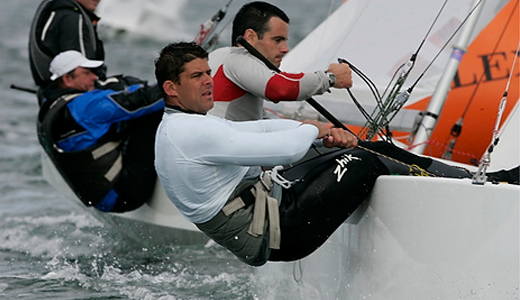
Peter O'Leary and David Burrows - fourth at the half way stage of the Bacardi Cup. Photo: Ingrid Abery. More HERE



























